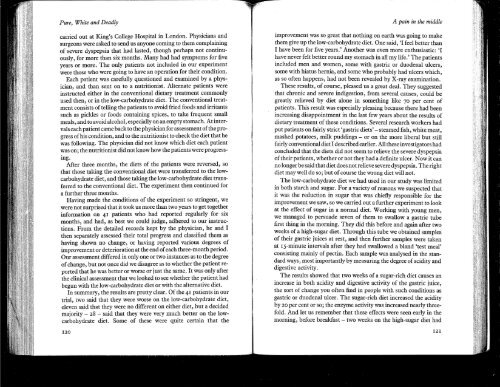John_Yudkin_-_Pure_White_and_Deadly_revised_1986_OCR
John_Yudkin_-_Pure_White_and_Deadly_revised_1986_OCR
John_Yudkin_-_Pure_White_and_Deadly_revised_1986_OCR
You also want an ePaper? Increase the reach of your titles
YUMPU automatically turns print PDFs into web optimized ePapers that Google loves.
<strong>Pure</strong>, <strong>White</strong> <strong>and</strong> Deadry<br />
carried out at King's College Hospital in London. Physicians <strong>and</strong><br />
surgeons were asked to send us anyone coming to them complaining<br />
of severe dyspepsia that had lasted, though perhaps not continuously,<br />
for more than six months. Many had had symptoms for five<br />
years or more. The only patients not included in our experiment<br />
were those who were going to have an operation for their condition.<br />
Each patient was carefully questioned <strong>and</strong> examined by a physician,<br />
<strong>and</strong> than sent on to a nutritionist. Alternate patients were<br />
instructed either in the conventional dietary treatment commonly<br />
used then, or in the low-carbohydrate diet. The conventional treatment<br />
consists of telling the patients to avoid fried foods <strong>and</strong> irritants<br />
such as pickles or foods containing spices, to take frequent small<br />
meals, <strong>and</strong> to avoid alcohol, especially on an empty stomach. At intervals<br />
each patient came back to the physician for assessment of the progress<br />
of his condition, <strong>and</strong> to the nutritionist to check the diet that he<br />
was following. The physician did not know which diet each patient<br />
was on; the nutritionist did not know how the patients were progressing.<br />
Mter three months, the diets of the patients were reversed, so<br />
that those taking the conventional diet were transferred to the lowcarbohydrate<br />
diet, <strong>and</strong> those taking the low-carbohydrate diet transferred<br />
to the conventional diet. The experiment then continued for<br />
a further three months.<br />
Having made the conditions of the experiment so stringent, we<br />
were not surprised that it took us more than two years to get together<br />
information on 41 patients who had reported regularly for six<br />
months, <strong>and</strong> had, as best we could judge, adhered to our instructions.<br />
From the detailed records kept by the physician, he <strong>and</strong> I<br />
then separately assessed their total progress <strong>and</strong> classified them as<br />
having shown no change, or having reported various degrees of<br />
improvement or deterioration at the end of each three-month period.<br />
Our assessment differed in only one or two instances as to the degree<br />
of change, but not once did we disagree as to whether the patient reported<br />
that he was better or worse or just the same. It was only after<br />
the clinical assessment that we looked to see whether the patient had<br />
begun with the low-carbohydrate diet or with the alternative diet.<br />
In summary, the results are pretty clear. Of the 41 patients in our<br />
trial, two said that they were worse on the low-carbohydrate diet,<br />
eleven said that they were no different on either diet, ,but a decided<br />
majority - 28 - said that they were very much better on the lowcarbohydrate<br />
diet. Some of these were quite certain that the<br />
120<br />
A pain in the middle<br />
improvement was so great that nothing on earth was going to make<br />
them give up the low-carbohydrate diet. One said, 'I feel better than<br />
I have been for five years.' Another was even more enthusiastic: 'I<br />
have never felt better round my stomach in all my life.' The patients<br />
included men <strong>and</strong> women, some with gastric or duodenal ulcers,<br />
some with hiatus hernia, <strong>and</strong> some who probably had ulcers which,<br />
as so often happens, had not been revealed by X-ray examination.<br />
These results, of course, pleased us a great deal. They suggested<br />
that chronic <strong>and</strong> severe indigestion, from several causes, could be<br />
greatly relieved by diet alone in something like 70 per cent of<br />
patients. This result was especially pleasing because there had been<br />
increasing disappointment in the last few years about the results of<br />
dietary treatment of these conditions. Several research workers had<br />
put patients on fairly strict 'gastric diets' - steamed fish, white meat,<br />
mashed potatoes, milk puddings - or on the more liberal but still<br />
fairly conventional diet I described earlier. All these investigators had<br />
concluded that the diets did not seem to relieve the severe dyspepsia<br />
of their patients, whether or not they had a definite ulcer. Now it can<br />
no longer be said that diet does not relieve severe dyspepsia. The right<br />
diet may well do so; but of course the wrong diet will not.<br />
The low-carbohydrate diet we had used in our study was limited<br />
in both starch <strong>and</strong> sugar. For a variety of reasons we suspected that<br />
it was the reduction in sugar that was chiefly responsible for the<br />
improvement we saw, so we carried out a further experiment to look<br />
at the effect of sugar in a normal diet. Working with young men,<br />
we managed to persuade seven of them to swallow a gastric tube<br />
first thing in the morning. They did this before <strong>and</strong> again after two<br />
weeks of a high-sugar diet. Through this tube we obtained samples<br />
of their gastric juices at rest, <strong>and</strong> then further samples were taken<br />
at Is-minute intervals after they had swallowed a bl<strong>and</strong> 'test meal'<br />
consisting mainly of pectin. Each sample was analysed in the st<strong>and</strong>ard<br />
ways, most importantly by measuring the degree of acidity <strong>and</strong><br />
digestive activity.<br />
The results showed that two weeks of a sugar-rich diet causes an<br />
increase in both acidity <strong>and</strong> digestive activity of the gastric juice,<br />
the sort of change you often find in people with such conditions as<br />
gastric or duodenal ulcer. The sugar-rich diet increased the acidity<br />
by 20 per cent or so; the enzyme activity was increased nearly threefold.<br />
And let us remember that these effects were seen early in the<br />
morning, before breakfast - two weeks on the high-sugar diet had<br />
121



